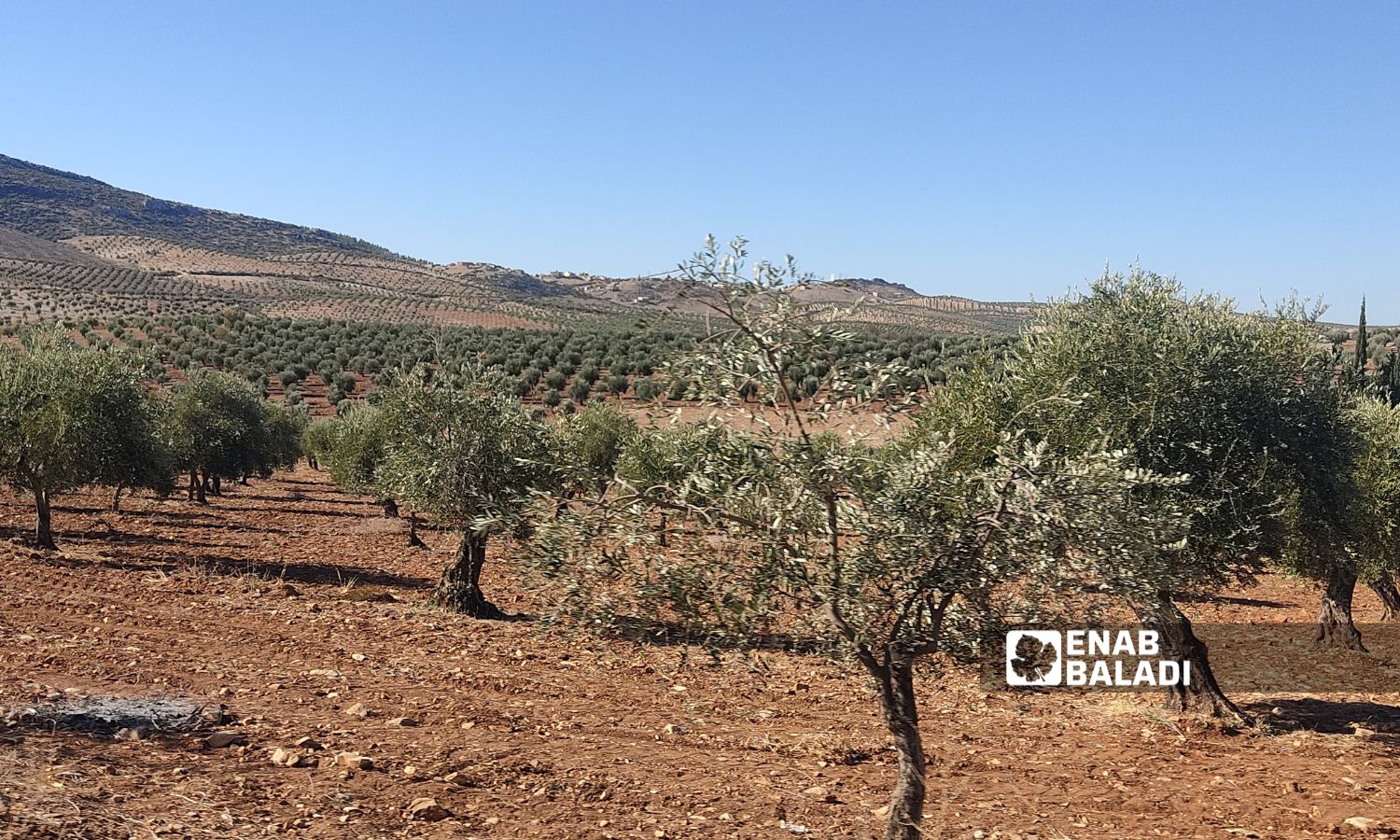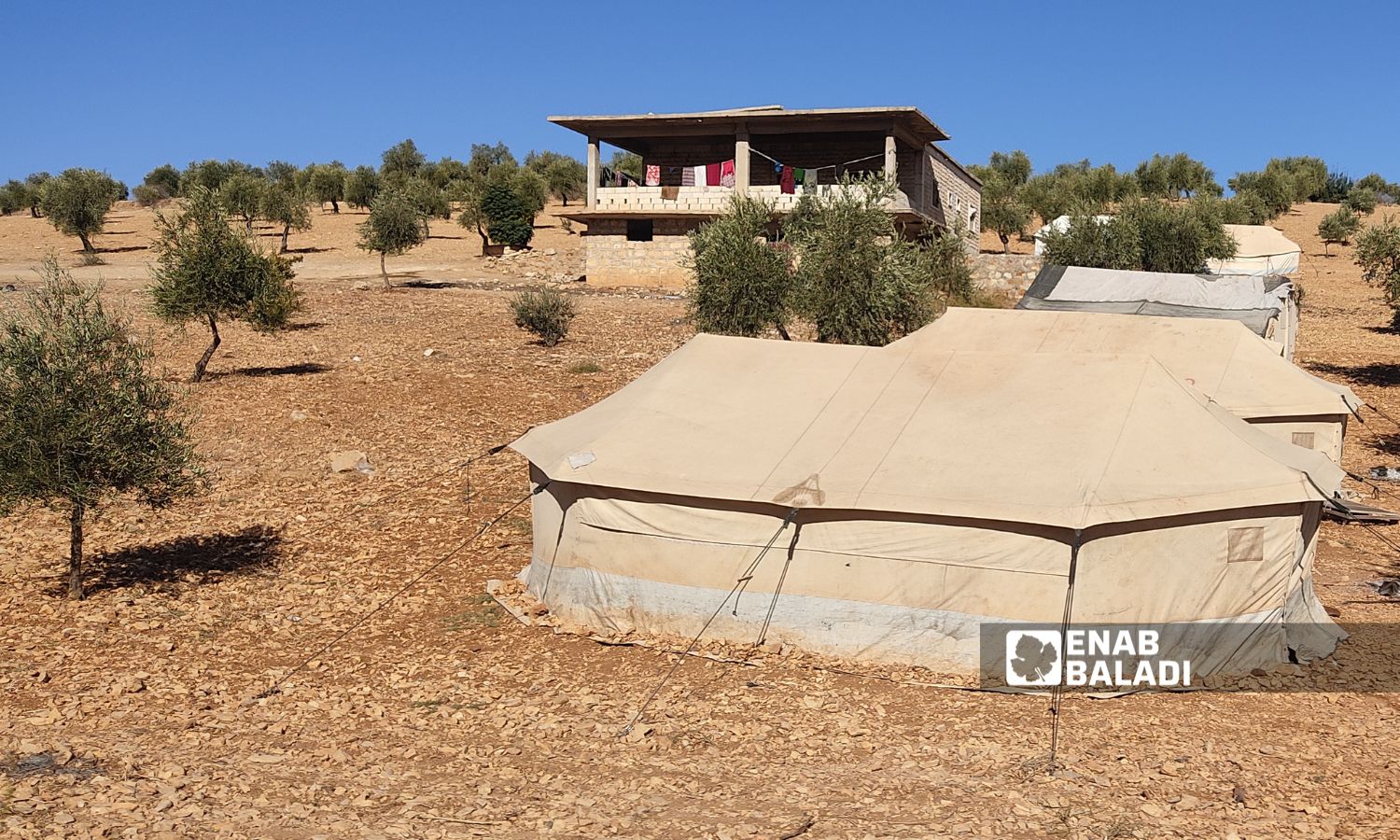



Abdul Majid al-Ahmad eagerly awaits the olive season every October, so he can begin the process of picking them by hand alongside his family to secure their supply of oil and olives, selling any surplus in the markets.
“Afarah” is the final stage of the crop picking from the trees, whether olives or others. After the picking teams finish, some fruits remain on the trees, and it requires significant effort and additional costs for the landowner to collect them. Therefore, they are often left on the trees or picked by someone else for free.
Al-Ahmad (50 years old), displaced from Hama countryside to the Bulbul district in Afrin, northwest Aleppo, and the father of six children, told Enab Baladi that he works in picking olives with his sons due to poor economic conditions and a lack of job opportunities.
He leaves with his sons at the break of dawn to work and returns at sunset, with each family member picking about five kilograms of olives.
By doing so, al-Ahmad secures his olive and oil supply after taking the olives to the mill, and the excess is sold in the market, reaching a price of 30 Turkish lira (0.88 USD) per kilogram.
Ali al-Shayesh (45 years old), displaced from Hama city and currently living in camps in the northern Idlib countryside, goes with his family of five to the village of Sa’ar Najak in Afrin during the olive season, sitting with relatives for olive picking.
Ali works with his family for about ten hours daily in orchards belonging to local residents, managing to collect 20 kilograms a day, most of which is pressed, while he keeps the quality fruits for winter storage, according to his statements to Enab Baladi.
Northwestern Syria is home to approximately 5.1 million people, of whom 4.2 million need assistance, and 3.6 million suffer from food insecurity, with 3.5 million being internally displaced, and two million living in camps, according to the United Nations.

A tent next to a house for people working in olive harvesting in the Afrin region, rural Aleppo – October 23, 2024 (Enab Baladi/Iyad Abdul Jawad)
Workers in olive picking in Afrin face unchanging obstacles over the past years, primarily harassment from the military factions operating in the area. Some factions require them to share part of their harvest, while others prevent them from entering the fields.
Since 2018, the Syrian National Army (SNA) factions, backed by Turkey, have controlled the area, and their treatment of civilians or olive harvesting operations varies between locals from Afrin or those involved in harvesting.
Some factions impose taxes on olives that landowners must pay them, and the tax amount varies based on the region and the controlling faction. Some places have even seen levies imposed at every stage of the harvest process, including pressing, with some demanding a fee for each individual tree.
Workers in olive picking told Enab Baladi that some factions condition them to split half of their harvest, while other factions have barred them from entering the orchards, forcing them to harvest in private orchards or remote, hard-to-reach areas.
Some factions control the orchards and occasionally confiscate the harvested olives on the pretext of not having official permission from the responsible faction.
The olive tree is considered one of the essential resources that the residents of northern Syria rely on, and a source of livelihood for both the landowners and the workers.
Afrin is famous for its abundance of olive trees covering most agricultural areas, and this crop occupies the top rank in the region regarding area and production.
According to Ahmed Hamahar, the director of the local council in Afrin, there are about 14 million and 225 thousand olive trees in Afrin and its outskirts.
The Afrin region is divided into seven sub-districts: Afrin, Sheikh Hadid, Maabatli, Sharan, Bulbul, Jindires, and Rajo.
Abdul Majid al-Ahmad expressed dissatisfaction with the conditions of olive harvesting this season compared to previous years, due to the clashes that occurred days ago between the Joint Forces on one side and the Suqour al-Sham Brigades and the Shamiyeh Front on the other.
The clashes forced al-Ahmad, al-Shayesh, and their families to stay indoors or choose orchards far from the conflict areas.
The clashes erupted between the two sides and lasted for two days, interrupted by a truce, following an attack by the Joint Forces on the Suqour al-Sham Brigades headquarters in the Hawar Kills area in rural Azaz, but spilled over to various countrysides of Aleppo, especially Afrin.
The clashes ended on October 17 of the current month after the Suqour al-Sham Brigades disbanded.
The Joint Forces include the Sultan Suleiman Shah Brigade, known as “al-Amshat,” led by Mohammed al-Jassem (Abu Amsha), and the Hamza Brigade, known as “al-Hamzat,” led by Saif Abu Bakr.
if you think the article contain wrong information or you have additional details Send Correction